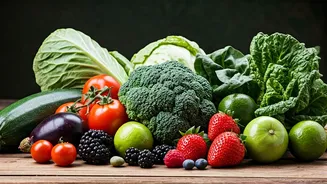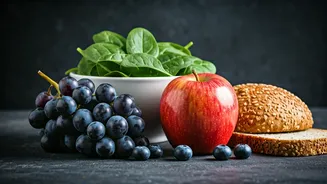Understanding Gas & Bloating
Gas and bloating are familiar complaints, often disrupting daily comfort. They commonly arise from dietary choices, specifically the foods we consume,
and the speed at which we eat them. Additionally, insufficient chewing, swallowing air while eating, and underlying health conditions can exacerbate these symptoms. The digestive system’s normal process involves producing gas as food breaks down. When the production of gas exceeds the body's ability to expel it, bloating occurs, leading to discomfort and sometimes pain. Understanding the causes is the first step toward effective management and the pursuit of foods that help minimize this issue, paving the way for improved digestive well-being. Finding the correct balance to prevent gas and bloating is key to feeling better.
Ginger's Digestive Power
Ginger, a well-known spice, has long been recognized for its potent digestive properties. Its active compounds, like gingerol, work to soothe the digestive system. It helps reduce bloating by stimulating gastric emptying. This spice also has anti-inflammatory properties, making it an excellent choice for soothing an irritated gut. Incorporating ginger into your diet can be as simple as adding it to teas, smoothies, or savory dishes. Its versatility allows for easy integration into various meals and beverages, providing a convenient way to reap its digestive benefits. By supporting the smooth movement of food through the digestive tract, ginger significantly contributes to the reduction of gas and bloating, thereby enhancing your overall digestive health.
Peppermint's Calming Effect
Peppermint is another natural remedy that offers relief from bloating and gas. The menthol in peppermint has a relaxing effect on the muscles of the digestive tract. This relaxation helps to reduce spasms and allows gas to move more freely, lessening the feeling of being bloated. Peppermint can be consumed in various forms, including teas and capsules. Peppermint tea, particularly, is a soothing choice, providing a calm, refreshing experience. Its ability to relieve digestive discomfort makes it a popular and effective choice. This versatile herb not only alleviates the symptoms but also helps in relaxing the body, making it a valuable addition to your dietary routine for digestive wellness and relaxation.
Fennel Seeds for Relief
Fennel seeds are a popular remedy in many cultures for digestive issues, including gas and bloating. These seeds have properties that help in easing the spasms in the digestive system. They contain anethole, which has anti-inflammatory and antispasmodic effects, reducing discomfort and promoting smoother digestion. Fennel can be chewed directly after meals or steeped to create a soothing tea. Their unique flavor makes them a pleasant addition to the diet. These seeds are a practical choice for incorporating into your diet, offering a delicious and efficient way to ease digestive distress. Whether you're facing occasional bloating or chronic digestive issues, fennel seeds can be a beneficial addition to your daily routine, providing significant relief.
Chamomile’s Soothing Touch
Chamomile is commonly recognized for its calming effects on the mind, but it also provides notable benefits for the digestive system. Chamomile’s anti-inflammatory properties can soothe the gut and alleviate bloating. Its gentle action on the digestive muscles helps to relieve spasms that trap gas. A warm cup of chamomile tea is a relaxing way to combat bloating and promote relaxation. Consuming chamomile before bed is especially beneficial. It aids in improving the quality of your sleep. Chamomile is a gentle yet effective way to manage digestive discomfort. Its calming benefits extend beyond just the stomach, making it a great choice for overall wellness.
Papaya’s Digestive Enzymes
Papaya is enriched with digestive enzymes, most notably papain, which aid in breaking down proteins, thereby aiding in digestion. This is particularly helpful in preventing and reducing bloating. Papaya helps to ensure the efficient breakdown of food in the stomach. By doing this, it reduces the likelihood of gas production and bloating. Consuming papaya can improve digestion and provide relief from associated discomfort. Incorporating this tropical fruit into your diet is a delicious and easy method to boost digestive health. Whether eaten fresh or added to smoothies, papaya is a healthy choice. It provides several benefits to support digestive wellness and ensure that your gut functions smoothly.
Pineapple’s Bromelain Benefit
Pineapple, similar to papaya, contains enzymes, such as bromelain, known for their digestive benefits. Bromelain aids in breaking down proteins, thereby reducing the chances of gas and bloating. This enzyme also features anti-inflammatory properties. This not only eases digestion but also alleviates inflammation within the digestive tract. Eating pineapple can significantly reduce digestive discomfort. It improves your body's ability to process food efficiently. Adding fresh pineapple to your diet is easy and can be enjoyed as a snack, added to salads, or incorporated into smoothies. This fruit offers a tasty way to improve digestive comfort, helping to feel lighter and more comfortable after meals.
Bananas: Fiber & Potassium
Bananas are known for their high fiber content. Fiber is important for promoting healthy digestion and preventing constipation. Constipation can contribute to bloating and discomfort. Bananas also contain potassium, which helps regulate fluid balance in the body, which, in turn, can help reduce bloating caused by water retention. The simple act of consuming a banana can significantly assist in reducing bloating. This everyday fruit not only provides essential nutrients but also supports regular bowel movements. This helps to manage digestive problems, making it a versatile and healthy choice for daily consumption. They're easy to carry, and eat on the go!
Yogurt: Probiotic Power
Probiotic-rich yogurt is a powerful ally in the battle against bloating and gas. Probiotics introduce beneficial bacteria to the gut, improving the balance of microorganisms. This, in turn, supports healthy digestion. These live bacteria assist in the breakdown of food. They can prevent the formation of gas and bloating. Eating yogurt regularly can help in decreasing digestive discomfort. It may also improve the overall gut health. Choosing yogurts with live and active cultures is essential for maximizing these benefits. Yogurt is a tasty way to help improve digestion and ensure your gut remains in good health. Consume it as a snack or as part of a meal to experience its benefits.
Peppermint Tea's Digestive Aid
Peppermint tea is another great option for dealing with gas and bloating. The menthol found in peppermint helps in relaxing the muscles of the digestive tract. This relaxation helps reduce spasms and makes it easier for gas to move freely, resulting in less bloating. Peppermint tea not only helps alleviate discomfort but also has a soothing effect. This can provide a sense of calm and well-being. Consuming peppermint tea after a meal can aid in better digestion. It can also help minimize the feeling of fullness and bloating. For anyone looking for a natural, tasty solution to digestive issues, peppermint tea is a beneficial and comforting choice.




















